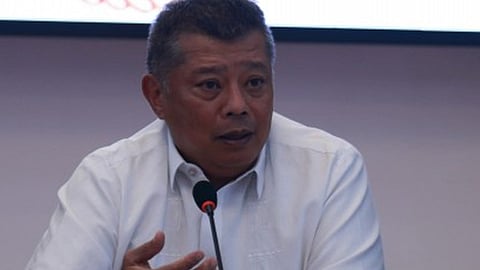

Justice Secretary Jesus Crispin Remulla on Monday told members of the United Nations Human Rights Council that the Philippines does not tolerate impunity and provides enabling space for civil society and human rights activists.
Speaking before the 41st session of the UNHRC Universal Periodic Review in Geneva, Switzerland, Remulla said the Philippines has a thriving, vibrant, and participative democratic space given the thousands of civil society organizations in the country.
"As you can see, the government does not hesitate to take action when there is compelling evidence to do so. We will leave no one behind," he said.
He added: "We will dispel the mistaken notion that there is a 'culture of impunity' in our country. We will not tolerate the denial of justice nor any violation of human rights."
The Philippine government, he added, will continue to invite CSOs, witnesses, and families of victims to come forward and provide information and file appropriate cases.
"We will provide support and security to witnesses under the Witness Protection Program, so that fear will not impede the administration of justice. This is the essence of the community pillar in our criminal justice system," he said.
He said reforms are underway on the drug-related killings to strengthen the internal affairs arm of the national police which will be given independence to "answer many questions about the impunity being talked about."
As he allayed fears of the return of capital punishment under the current administration, he said President Ferdinand R. Marcos Jr. has refocused the campaign on illegal drugs by tackling poverty eradication and giving priority to rehabilitation, prevention, education, and assistance to victims and their families.
"I assure everybody here that President Marcos is not inclined to restore the death penalty anytime in his term in office," he said.
In its UPR that assessed the human rights record of member states, UNHCR urged the Philippines to take action to protect and promote human rights, including addressing killings in the war on drugs and ensuring access to justice for victims.
"The Philippines looks at the Universal Periodic Review as a valuable platform for peer review in the implementation of recommendations made since our third cycle review in 2017. On this note, consistent with our duty and obligation to promote, protect, and fulfill the human rights of our people, we take pride in underlining our significant accomplishments and best practices in human rights promotion and protection," he added.
He said the Philippines' engagement in the UPR aligns with the government's commitment to sustain active, open, and constructive dialogue with the international community and relevant UN mechanisms on human rights.
"In this spirit, our national report for this fourth cycle was prepared through inclusive consultations with decision-makers and stakeholders, including civil society," he added. "Careful review was undertaken on the recommendations arising from the last cycle."
Remulla said of the total 257 recommendations received, 103 were accepted, fully supported, and implemented by the Philippines.
The accepted recommendations focused on the following areas: scope of international obligations and cooperation with human rights mechanisms; national human rights framework; right to development; environment; human rights and counter-terrorism; right to life, liberty, and security of persons; administration of justice, including impunity, and the rule of law; prohibition of all forms of slavery; right to privacy and family life; right to work and to just and favorable conditions of work; right to social security; right to an adequate standard of living; right to health; right to education; and sector rights involving women, children, persons with disability, migrants, asylum seekers, internally displaced persons, and stateless persons.
The Philippines noted though that of the remaining 154 recommendations, 99 required processes that go beyond the control of our branch of government.
"The Philippine Government, nonetheless, will make best efforts to implement these recommendations, taking into account national, cultural, and historical circumstances and constraints," he said.
He lame nted that some of these recommendations appear to insinuate, advertently or inadvertently, that the State has not taken any action on concerns raised.
"This despite our submission of our national report and during interactive dialogues. For instance, the issue of the death penalty and the lowering of the age of criminal responsibility were sufficiently addressed during the interactive dialogue and subject of deliberations in our Legislature," he added.
The Philippines, he said, did not support 55 recommendations since they seem to be too sweeping, vague, or even contradictory.
"Ours is a vibrant and active democracy, among the freest in the world. Nonetheless, some of these recommendations may merit future consideration by our government," Remulla said.
In the period covering the review cycle, the Philippines served its fourth and fifth terms in the UN Human Rights Council, championing reforms in human rights.
